Liz Truss conference speech: what the Prime Minister said - and what she actually meant
and live on Freeview channel 276
Liz Truss has told voters she is “on their side” in her first speech as Prime Minister at the Tories’ annual conference.
Addressing Conservative Party members at the event in Birmingham, she tried to assure those listening that “everyone will benefit” from her new policies. It comes after a turbulent few days for the Prime Minister, where she has been under fire for her recent tax cuts which sent the country into economic turmoil.
Advertisement
Hide AdAdvertisement
Hide AdPerhaps in reference to this, the South West Norfolk MP acknowledged that “these are stormy days” - but said she is determined to get Britain “through the tempest” and “put us on a stronger footing as a nation.”
The speech, which lasted just over half an hour, contained no new policy announcements - and made no reference to benefits, which is currently a topic of struggle and debate within her Cabinet. But that is not to say there was nothing of note.
One of the most dramatic moments of course was when protesters from Greenpeace interrupted the Prime Minister, holding up a “who voted for this?” sign in opposition of the new Government’s support for fracking. But outside of this, Ms Truss also made a few interesting comments - so we’ve put together, and dissected, some of the key ones below.
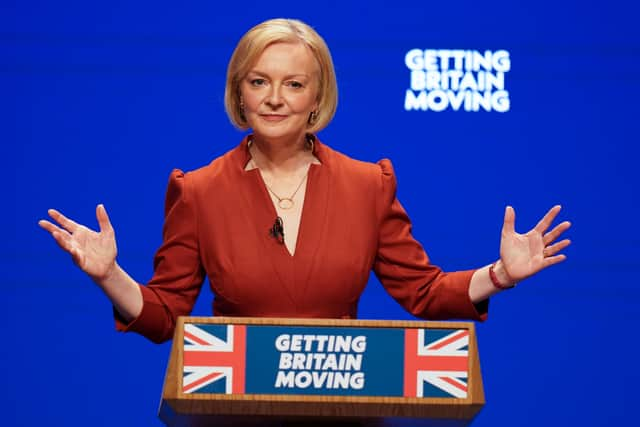

‘Whenever there is change, there is disruption’
The line which arguably encapsulated the country’s current position the most was when Ms Truss stated “whenever there is change, there is disruption”.
Advertisement
Hide AdAdvertisement
Hide AdIt was an admittance of the past week of upheaval experienced by the UK, during which the pound hit a record low against the dollar, the Bank of England made an extraordinary economic intervention to essentially bail out the Government, and Ms Truss and Chancellor Kwasi Kwarteng were forced to U-turn on plans to axe the 45p tax rate for the country’s highest earners - despite the Prime Minister saying she was “absolutely committed” to it just one day before.
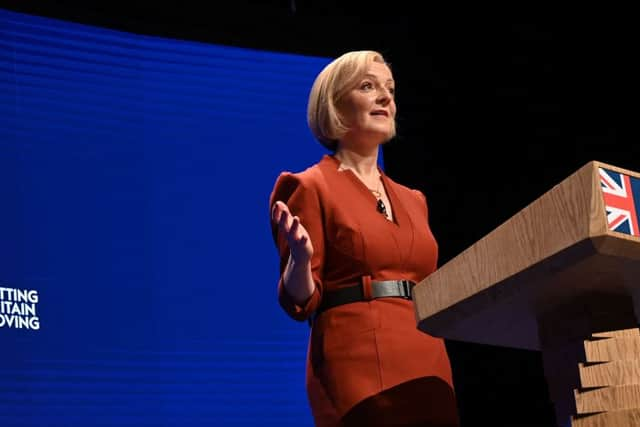

But Ms Truss made no signs the “disruption” would be stopping any time soon. In fact, she hinted there was more to come, insisting that “the status quo is not an option” and “we must stay the course.”
She also admitted “not everyone will be in favour” of her plans, which is a reminder of her declarations in the past that she is not afraid to be unpopular. This is possibly another testament to that sentiment.
But she continued to show confidence in her plans, no matter how controversial they may be, promising that “everyone will benefit from them”. Only time will tell if this holds true.
‘Anti-growth coalition’
Advertisement
Hide AdAdvertisement
Hide AdA favourite soundbite of Ms Truss over the past few weeks has been a somewhat strange turn of phrase - the so-called “anti-growth coalition”.
The people she has labelled as part of this group include Labour, the Lib Dems, the SNP, “militant unions”, and environmental campaigners - like, she said, the ones who heckled her during her speech.
She said these people are “enemies of enterprise”, and are hindering her vision of “growth, growth, growth” for Britain.
The former Foreign Secretary, who in her younger years was a Liberal Democrat, took particular aim at striking workers and Extinction Rebellion, saying they do not understand the “frustration and challenges of normal working people - to see your road blocked by protesters or your trains off due to a strike.” She also claimed members of the “anti-growth coalition” believe people who “stick themselves to roads and trains and buildings are heroes.”
Advertisement
Hide AdAdvertisement
Hide AdBut in opposition to this, Ms Truss affirmed that to her, the “real heroes” are those who “go out to work, take responsibility, and aspire to a better life for themselves and their families.”
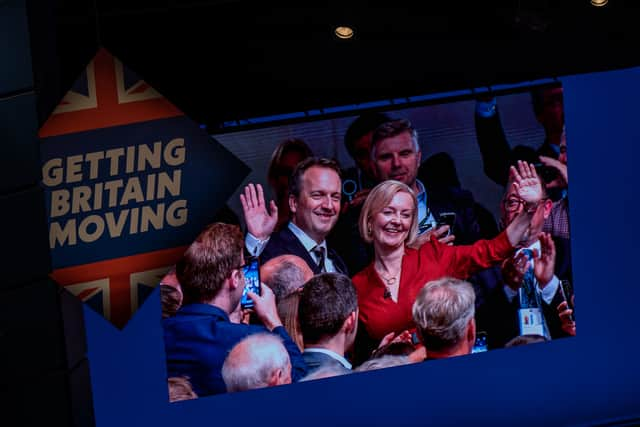

‘I want what you want’
In what was possibly a continued attempt to position herself as a leader who is on the people’s “side”, Ms Truss claimed to “want what you want” - adding “I know how you feel because I have the same hopes and fears.”
The concerns she listed as examples of these were whether or not someone can “get a good job locally”, whether it’s “safe to walk down the high street late at night”, and whether or not one can “get a doctor’s appointment”.
The Prime Minister’s focus on helping people get a job “locally” may be a reference to the Government’s levelling up agenda, which intended to boost the economies of areas outside London and the south-east. But despite the plans supposedly being a priority for the Conservatives, the Government has come under fire for not following through - with various think-tanks, such as IPPR, saying regional inequality is still an issue, and in some places, is getting worse.
Advertisement
Hide AdAdvertisement
Hide AdIn terms of comments around walking safely down the street, this comes as part of Ms Truss’ already-announced “back to basics” police plan. The former Women and Equalities Minister said in her Tory leadership campaign she wants to place a particular focus on women’s safety, and pledged to introduce a National Domestic Abuse Register to help break the cycle of repeat offending by abusive men.
She has also promised to “increase police training” and accelerate the “processes for rape victims”.
Whilst assuring voters that she will deal with NHS waiting times and the huge backlog in hospitals and GP surgeries, Ms Truss also took a moment to praise her Health Secretary Therese Coffey - who she said will tackle this issue head-on.
‘Break Britain out of a high-tax, low growth cycle’
Returning to her favourite topic, the Prime Minister also took a moment to once again vow to break Britain out of a "high-tax, low-growth cycle".
Advertisement
Hide AdAdvertisement
Hide AdDespite intense backlash to some of her recent tax cuts - which forced a U-turn on the Government’s scrapping of the 45p income tax rate for highest earners - Ms Truss expressed continued confidence in her tax cuts, and said the other cuts announced in the Chancellor’s mini budget, such as the cuts to stamp duty, corporation tax and national insurance, will help with her “growth” plan.
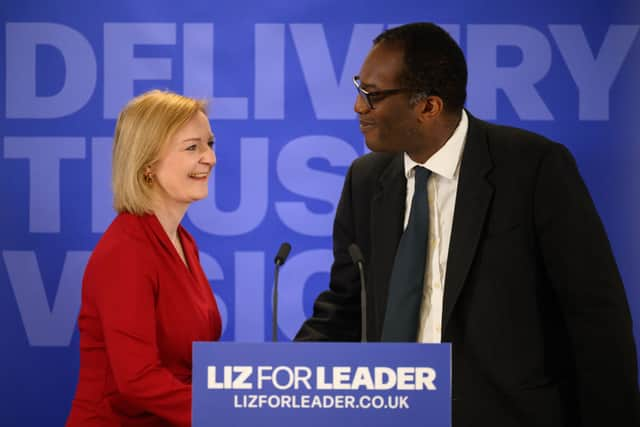

‘Cutting taxes is the right thing morally and economically’
Following on from this, the Prime Minister boldly claimed that cutting taxes was “the right thing to do morally and economically”. Once again, she made sure to show a steadfast commitment to her key campaign pledge.
She claimed: “Tax cuts are morally right because it is people’s money, and economically right because, with more of their own money, they will do more of what they do best.”
Of course, these much talked-about tax cuts are, according to many experts, what threw the country’s economy into disarray - so perhaps in an attempt to reassure the markets, Ms Truss also caveated this statement with a promise to “keep an iron grip on the nation’s finances.”
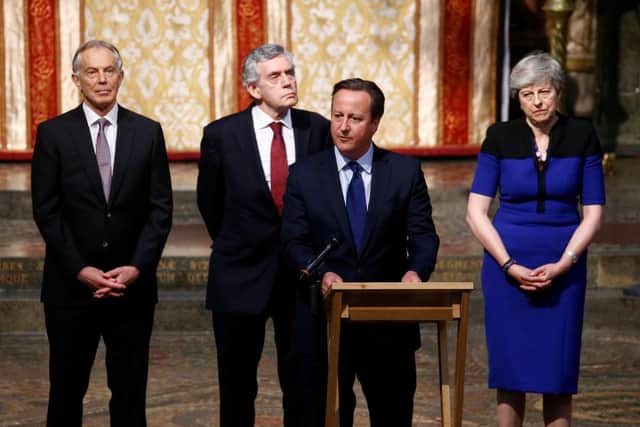

‘The first Prime Minister to have gone to a comprehensive school’
Advertisement
Hide AdAdvertisement
Hide AdTo applause, Ms Truss told party members: “I stand here today as the first prime minister of our country to have gone to a comprehensive school.”
Her background is one she frequently referenced throughout her leadership pitch, again trying to position herself as one of the people. However, while it is true that Ms Truss did attend a state school, it is not true she is the only previous prime minister to have done so.
Sky News reported that Gordon Brown, Labour’s most recent prime minister, attended Kirkcaldy High School, a comprehensive in Fife.
Former Tory prime minister Theresa May meanwhile attended a grammar school which was reorganised into a comprehensive school during her education.
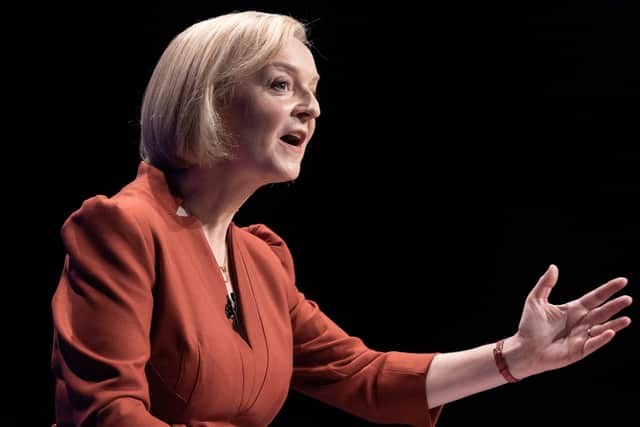

‘Level up the country in a Conservative Party way’
Advertisement
Hide AdAdvertisement
Hide AdMs Truss stayed on the topic of her upbringing when she spoke of levelling up, claiming that growing up in Paisley and Leeds in the 1980s and 1990s meant she knew what it was like "to live somewhere that isn’t feeling the benefits of economic growth".
Some have pointed out it is a strange move for Ms Truss to frequently criticise the policies during this stage in her life, when Margaret Thatcher, who she is often compared to, and the Conservative Party, were in power.
Former Tory MP Rory Stewart wrote on Twitter: “Why does Liz Truss keep referring to her experience in the 80s and early 90s in Paisley and Leeds as an example of poor economic policy while also advocating for this form of economics.”
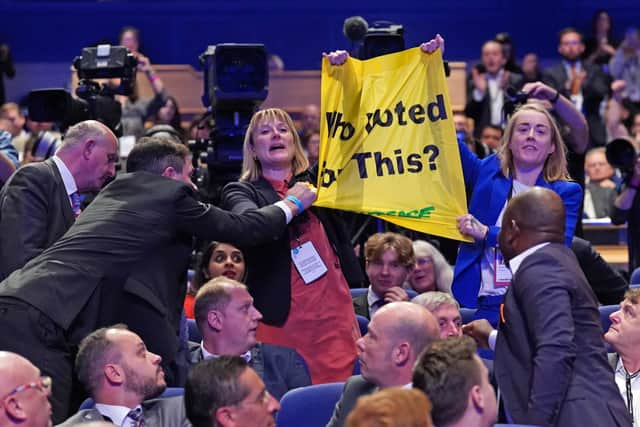

‘Let’s remove them’
It may not be a reference to her policies, but the moment Ms Truss was heard saying “let’s remove them” after Greenpeace protesters interrupted her speech has been a much-discussed one on social media.
Advertisement
Hide AdAdvertisement
Hide AdThe protesters held up a banner which said “who voted for this?” in relation to the Government’s support for fracking, and heckled the Prime Minister before they were removed by security.
Rebecca Newsom, one of the protesters, told PA Media after the incident: “In a healthy democracy, people should get the government programme they voted for, but Liz Truss is putting most of it through the shredder.”
The other protester, Greenpeace policy officer Ami McCarthy, added: “People voted for strong action on climate, a fracking moratorium, world-leading environmental protections, and tackling poverty and inequality.”
Health Secretary Ms Coffey has praised Ms Truss for her handling of the situation.
"Liz got on with it," she told the BBC. "She showed her resolve."
Comment Guidelines
National World encourages reader discussion on our stories. User feedback, insights and back-and-forth exchanges add a rich layer of context to reporting. Please review our Community Guidelines before commenting.
